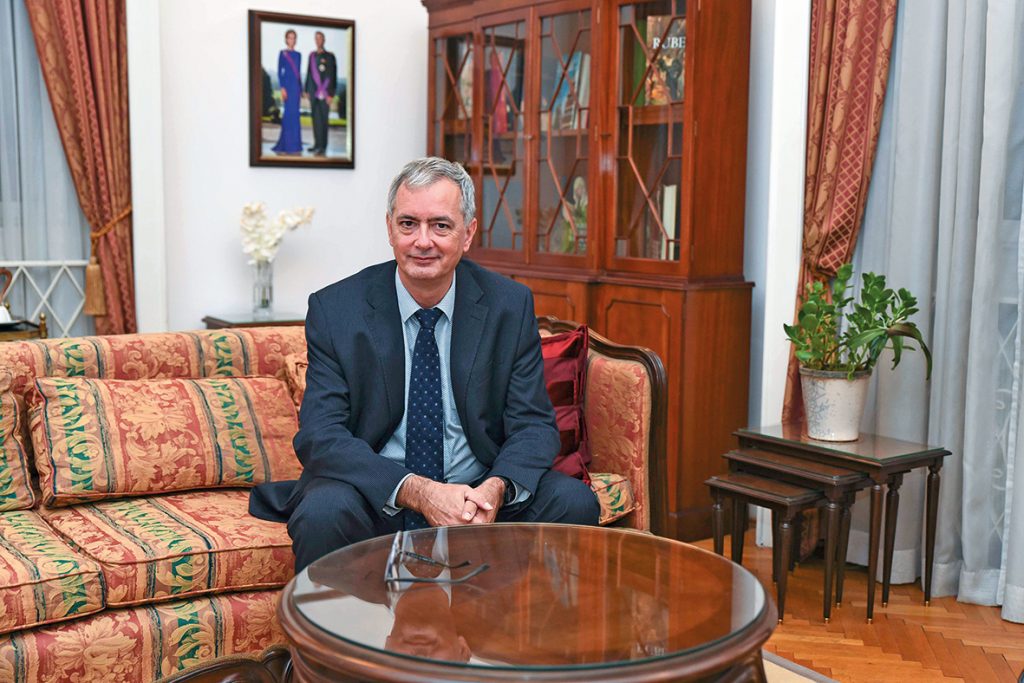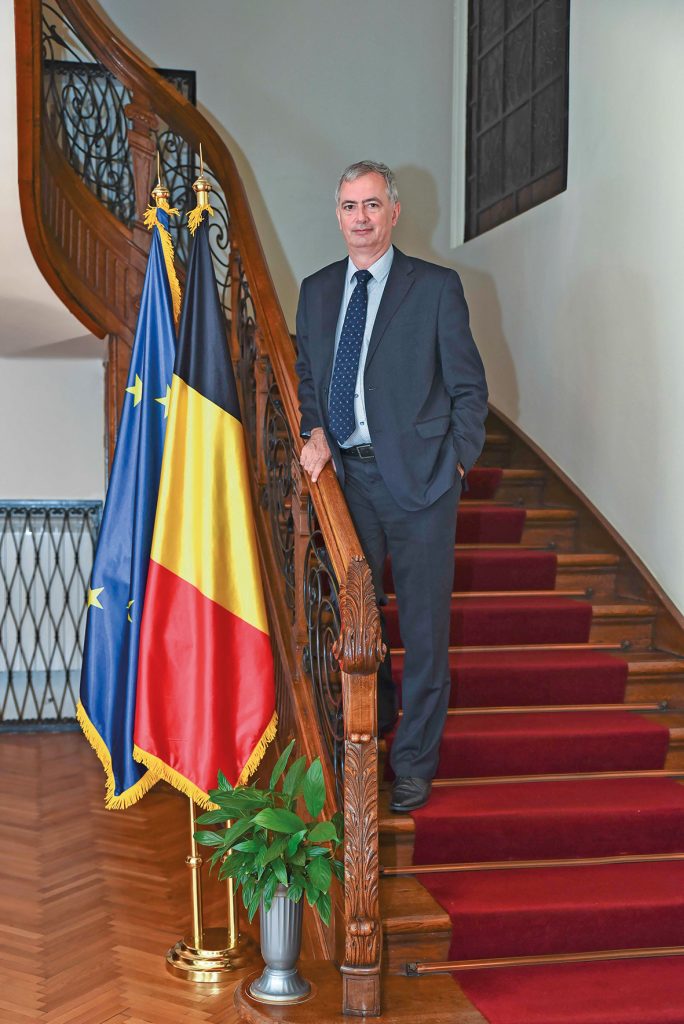Multilateralism allows for countries such as Belgium and Serbia to increase their impact on major international decision making, and avoid being just dependent on what major powers decide
The Belgian Ambassador to Serbia, H.E. Koenraad Adam , believes that the UN values and multilateralism are very important, that they are in Belgium’s DNA. The capital of Belgium is the host of the Belgrade-Priština dialogue, so he hopes that two governments will finally come to a ‘Brussels agreement’ that would open perspectives for addressing the peoples’ real needs.

The meeting of Belgian and Serbian prime ministers took place in the margins of the 76th session of the UN General Assembly in New York. How would you rate overall relations between the two countries?
September was a very intensive month with many diplomatic contacts at the highest level, between both of our countries. The meeting in New York [24/09] took place in the margins of the UN General Assembly and allowed Prime Ministers Brnabić and De Croo to exchange views on the current regional and international diplomatic challenges and how our countries may best respond to this. A bigger part of the conversation was dedicated to Serbia’s EU integration path and the Belgrade-Priština dialogue. Earlier, Serbian Foreign Minister Nikola Selaković was welcomed in Brussels by Vice Prime Minister and Minister of Foreign Affairs Sophie Wilmès for an exclusive bilateral visit, marking 135 years of bilateral relations. On that occasion, a bilateral Memorandum of Understanding was signed, aiming to step up the frequency of bilateral consultations. This is a good illustration of the quality of the relations and our ambition to strengthen and amplify them.
They discussed, among other topics, the importance of the Belgrade-Priština dialogue. What are Belgium’s views on this dialogue?
Belgium is one of the many countries that have recognized Kosovo’s independence. We have always made clear that we see the future of Serbia, Kosovo and the other Western Balkan countries as part of the EU family. For that to happen, many conditions still have to be fulfilled, one of them being the normalization of relations between Serbia and Kosovo. The Belgian government fully supports the efforts of the European diplomacy, embodied by the EU Special Representative M. Lajčák, to come to a comprehensive agreement that would remove this obstacle on the road to EU membership. Belgium’s capital city, Brussels, is host to the so-called Belgrade- Priština dialogue, and we hope that both governments will show determination and political will to finally come to a final ‘Brussels agreement’ that would open perspectives for addressing the peoples’ real needs: socio-economic wellbeing, security, good education and job perspectives, a clean environment, good health conditions and generally the fulfilment and respect of their fundamental rights, including cultural and minority rights. I was recently in Kosovo, and I returned with the overall impression that this is indeed the focus that the Kosovar Albanian and Serbian people expect from their leadership.
“The Serbian Foreign Minister Nikola Selaković was welcomed in Brussels by Vice Prime Minister and Minister of Foreign Affairs Sophie Wilmès for an exclusive bilateral visit, marking 135 years of bilateral relations”
This requires trust and confidence in each other’s good faith in the process. Issues close to people’s hearts and minds, such as the question of missing persons, with families throughout the region still waiting for news about what happened to their loved ones, create opportunities for such an indispensable rapprochement. Let us not forget that we talk about peoples who will always remain neighbours who are both striving to be part of one European family, where borders evaporate in an almost natural way. Good faith has also to be reflected in the correct and complete implementation of past agreements, which are building blocks towards an overall agreement that is long overdue.
Belgium is a firm believer in the UN values, while multilateralism is in Belgium`s DNA. How important is to spread the word about multilateralism in diplomacy?
Multilateralism is indeed part of our DNA. It was not a coincidence that Paul-Henri Spaak, Foreign Minister of Belgium, was elected first President of the General Assembly of the United Nations on January 16, 1946. You will always find Belgium at the forefront of initiatives that aim to pool sovereignty in bigger, integrated formats that bolster our capacity to diplomatically project and protect our interests. Multilateralism allows for countries such as Belgium and Serbia to increase their impact on major international decision making, and avoid being just dependent on what ‘major powers’ decide. But there is of course an even more important dimension to this: the challenges the world is facing can simply not be effectively and efficiently addressed without multilateral cooperation. The health and climate crisis, migrants and refugee issues, but also the fundamental values and human rights transcend our national borders. That’s why Belgium invests a lot of diplomatic energy in being present in multilateral fora, including in the UN where we just concluded a two-year term (2019-2020) as a non-permanent member of the UN Security Council. For the same reason, the already mentioned bilateral MOU between Belgium and Serbia seeks to support each other’s candidates for multilateral positions. We Belgians, known for our art of compromise, which turns politics in our country into a quasi-permanent diplomatic conference, have definitely something to contribute to multilateral decision making: seeking consensus and building bridges is for Belgium a question of survival, a motivation we happily share with the rest of the world!
At Dubai Expo 2020, Belgium offers innovative solutions for more sustainable transport. What is Belgium’s view on mobility?
Belgium is one of the most densely populated countries in the world, and the efficient and sustainable organization of our mobility is a key area of attention of policymakers. We were the railway pioneers on the European continent, and we exported this know-how also to Serbia – at the end of the 19th century, the Belgian Société Générale constructed 82km of railway between Vrška Čuka and Radujevac. These days modern public transport plays a crucial role in the decongestion of our transport infrastructure. It is this no coincidence that in this European Year of Rail the well-known Europalia Arts Festival in Brussels (open till May 15, 2022!) is dedicated to ‘Train and Tracks’. Belgian regions invest pay a lot of attention and invest resources in the construction of bicycle highways, that, combined with generous fiscal advantages, promote the use of bicycles for commuting purposes. Noteworthy as well is the recent decision by Flemish authorities to stop registering all non-electric cars by 2029, i.e. 6 years sooner than required by the EU Commission. In this area, and in particular, in terms of the mobility-impact of low-emission-zones in urban areas, we will certainly be able to share our know-how and good practices with countries such as Serbia, which is still in the initial phase of rolling out of the Green Agenda.

Economic relations between Belgium and Serbia are stable. In which areas do you see the potential for improving this cooperation?
There is no doubt that the three basic orientations of the 9 MIA € European Investment plan -regional interconnectivity, the digital and green agenda – are the areas where Belgian companies and research institutions can showcase large scale expertise and know-how, that could benefit Serbian counterparts, private and public institutions as well as local authorities. Belgian companies are eager to participate in the numerous infrastructure projects, be it in the transport sector, waste (water) treatment or renewable energy, provided the necessary business conditions are in place. Several companies are already active in the wind farm sector and the digital economy and have been expanding their activities. What business needs to increase its presence in Serbia is a predictable and transparent investment climate, where the Rule of Law prevails. Serbia has some excellent laws, such as the EU-compatible procurement legislation, that need to be fully implemented without leaving room for backdoor arrangements.
Belgian architects Dries Vens and Maarten Vanbelle visited Belgrade and shared their vision on how contemporary architecture can contribute to more sustainability. How important is cooperation in culture and art?
I was impressed by the presentation of their work, held in my home town, Ghent. The preservation of cultural patrimony creatively and sustainably contributes to the attractiveness of the urban fabric and hence its tourist potential. In Belgium, we have learned from past mistakes with regard to urban planning, having lost many beautiful and historical buildings to developers’ greed and concrete. I sincerely believe that cities such as Belgrade have no time to waste to avoid similar irreparable mistakes. Brussels region and Belgrade are finalizing a Memorandum of Understanding, which opens the way to expert exchanges in these and other areas of mutual interest.
“Serbia has some excellent laws, such as the EU-compatible procurement legislation, that need to be fully implemented without leaving room for backdoor arrangements”
Besides this, it goes without saying that bilateral cooperation in the cultural area is of tremendous importance for the promotion of people-to-people contacts. I was particularly pleased that the last edition of BITEF theatre and BDF dance festivals awarded prestigious prizes to the Belgian contributions (Ultima Vez, Ehsan Hemat and Peeping Tom).
What connects you to Serbia and what do you like the most about Belgrade?
A recent private tour in the region, through North Macedonia, Albania and Kosovo, culminated in a profound sense of ‘homecoming’, when we came back to Belgrade. The city has a ‘je ne sais quoi’-attractiveness and charm that distinguishes it from many other destinations I have visited in the Balkans. It is probably thanks to a mixture of the rich and profound historical layers, the abundant cultural life and the genuine kindness and hospitality of its people that my wife and I are so fond of Belgrade. We are also looking forward to resuming our pre-Covid discovery tour of the beautiful nature and cities elsewhere in Serbia and enjoying the quietness of the countryside and clean air.